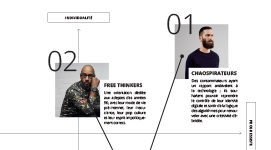domain 3 : sales techniques
STORE MANAGER TRAINING
(LEVEL 5 CERTIFICATION IN THE PROCESS OF VALIDATION RNCP)
This area discusses the keys to merchandising for store and window display. Sales pitches and handling customer disputes are covered.

AREA 03 - CHAPTER 01:
DISRUPTION ANALYSIS

Area 03 - Chapter 02:
FITTINGS
STORE SPACE

Area 03 - Chapter 03:
CUSTOMER LOYALTY
AFTER-SALES SERVICE
AREA 03 / CHAPTER 01 - DISRUPTION ANALYSIS
A - DEFINITIONS
- What are we talking about?
- Disruption is fashionable
- Disruption is part of the evolution
B - SYMBOLIC DISRUPTIONS
- Disruption as a symbol of a new era
- Political disruptions
- Disruptions in values
- The case of decathlon
C - TRENDS AND COUNTER-TRENDS
- Introduction
- Minimalism VS Maximalism
- Natural VS Synthetic
D - TECHNOLOGICAL DISRUPTIONS
- Disruption at the service of a technological revival
- Digital fashion
E - IDENTIFY POPULATIONS OPEN TO CHANGE
- Heterophiles and homophiles
- Heterophilic populations
- Locate where the cool is located
F - IDENTIFY EMERGING SIGNALS
- Identify emerging signals
- Identify sectors that are ripe for disruption
- Cross-reference the evidence
AREA 03 / CHAPTER 02 - STORE FITTING
A - SHELVING
- Definition
- Methods to be followed
B - FITTINGS
- Importance of the layout
- Optimizing the layout
- The different forms of merchandising
C - REASSORT
- Inventory definition
- Three methods for inventorying stock
- Management
D- DEFINITION OF THE PLV
E- TOOLS OF THE PLV
- Interior
- Outdoor
- Limitations
F- ISSUES OF THE PLV
- Attracting attention
- Involve the consumer
- Sell the product
- Be clearly identifiable and simply inform.
G- IMPORTANCE OF DIGITAL
- Definition
- History
H - WHICH SUPPORTS?
- Click & Collect
- Interactive fitting rooms
- Mobile checkouts
- Interactive kiosks
I - CHALLENGES FOR THE CUSTOMER EXPERIENCE
- Increasingly connected customers
- Added value proposition
- The benefits
J - CUSTOMER JOURNEY DEFINITION
K - HOT AND COLD ZONES
- The hot zones
- Cold zones
L - THE 5 STEPS
- Acquisition and consideration
- Purchase decision and retention
- Recommendation
M - WINDOWS
- Coherence
- Renewal
- Staging
AREA 03 / CHAPTER 03 - LOYALTY / SERVICE
A - BUILDING CUSTOMER LOYALTY / DIGITAL
- Strengthening customer relations
- Quality of service
- Giving voice to customers
- Selling more to those who buy!
- Evolution of the offer
B - BUILDING CUSTOMER LOYALTY / PHYSICAL COMMERCE
- Provide an experience
- Thank your customers
- Flexibility
- Flexibility - Example
C - LOYALTY PROGRAMS
- What is a loyalty program
- Loyalty software
- Creating your loyalty program
- Relational and social loyalty
- Loyalty cards
- Sponsorship programs
- Example of a loyalty program: NIKE
- Example of a loyalty program: NATURE & DECOUVERTES
- Example of a loyalty program: DEVIANE
D - THE CUSTOMER FILE
- What is a customer file?
- Building a customer file
- Processes for collecting information
E - CUSTOMER EXPERIENCE
- What is customer experience?
- Customer Experience: Optimization
F - COMMUNICATION
- Simplicity and immediacy
- Newsletter
- Social networks
G - COMMERCIAL PROMOTION
- Definition of a trade promotion
- Example of a trade promotion
H - BLACK FRIDAY
I - REBATE, DISCOUNT AND EXCESS
J - SALES
- Definitions of Sales
- Law in force
- Organization of sales
- Management of sales
K - PLANNING THE BRANDS
L - LITIGATION
- What is after-sales service
- A good after-sales service management
- Anticipate and manage possible disputes

